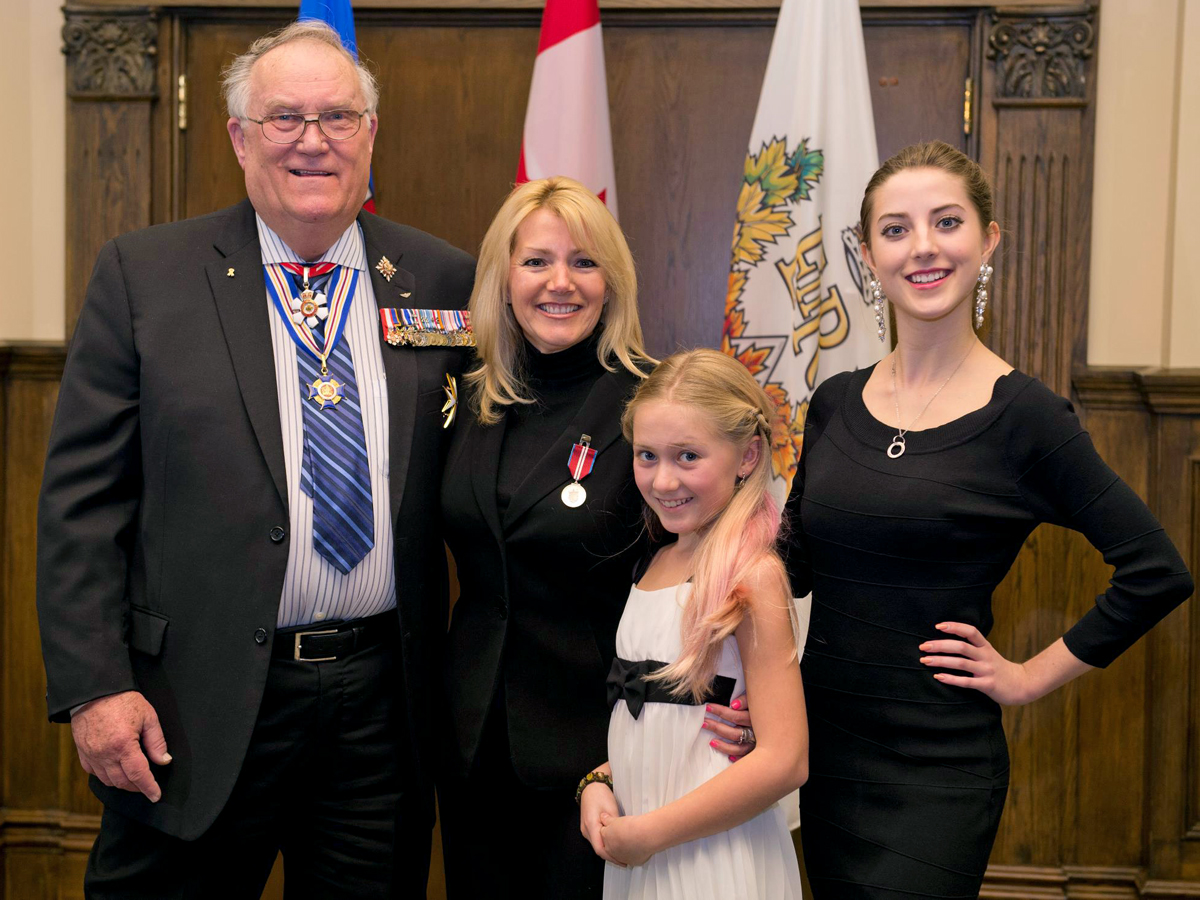Esquimalt’s Hidden Heroes: The Byrnell family’s military legacy
By Lookout Production on Nov 15, 2024 with Comments 0

The Byrnell family while being awarded the Queen Elizabeth II Diamond Jubilee Award.
Kate Bandura, Lookout Contributor
—
Wes Byrnell’s remarkable career spans both military service and pioneering work in sports medicine, leaving an indelible mark on the Canadian Armed Forces (CAF) and the field of athletic therapy.
In 1976, Byrnell was awarded the prestigious Order of Military Merit, one of the highest honours in the Canadian military. This recognition underscored his significant contributions to the CAF and his dedication to service.
A substantial portion of Byrnell’s military career was spent at Royal Roads Military College, where he trained and mentored young cadets, preparing them for future leadership roles. His impact on the institution was so profound that upon his retirement, he was granted the rare honour of taking the salute on the parade grounds – a privilege typically reserved for commanding officers.
“It was usually the commanding officer who would do this, but they made an exception for Dad,” his daughter Carrie Kohan recalls emotionally. “It was a beautiful goodbye from all the cadets and graduates. It still makes me cry that they honoured Dad that way.”
Byrnell’s commitment to serving his fellow military personnel didn’t end with his retirement from Royal Roads. He established a sports clinic at CFB Esquimalt’s Naden, where he volunteered extensively, treating personnel from all military branches. This clinic became a testament to his ongoing dedication to the welfare of servicemen and women.
At the Naden clinic, Byrnell’s innovative spirit shone through. He introduced groundbreaking hydrotherapy techniques and invented several tools that are still used by athletes today, including the tilt board and the Velcro sock holder, made for soccer players which was used in the 1976 Olympics. His contributions to sports medicine earned him a place in the Victoria and B.C. Sports Hall of Fame.
The Byrnell family’s military ties run deep. Kohan’s mother was a veteran of the Women’s Royal Canadian Naval Service, and she herself joined the Air Cadets from ages 13 to 16.
“I played the glockenspiel in the band, marched, and spit-polished my boots like nobody’s business,” she says.
Life on the military base in Belmont Park, Royal Roads Military College, and Esquimalt, held fond memories for the Byrnell family.
“The children could play hide and seek and stay out till the streetlamps came on. The sense of safety and community was incredible in Esquimalt,” Kohan says. “But my fondest memories are of when my father would work with up-and-coming athletes at his clinic at the Esquimalt pool, or with all the people he brought into our tiny home to be taped for sports events. Olympic athletes would show up on short notice at the door with their trainers and say, ‘Wes, can you work your magic on these injuries?’
Kohan volunteered at her father’s hydrotherapy clinic at the Esquimalt Pool in the 1980s and witnessed many transformations, such as with a young mother who was paralyzed in a wheelchair from an epidural.
“The doctors told her she’d never walk again, but Dad welcomed her into his clinic started her on a weekly program of using his homemade, welded, steel paddles in the pool (which were the first hydrotherapy equipment ever made by him),” Kohan recalls. “This was the kind of work Wes Byrnell did at the Esquimalt Pool. He helped people heal, especially people who came with no hope.”
The mother went from a wheelchair to crutches, to a cane, and to walking on her own within the year. Despite his world-renowned reputation, Byrnell never sought personal financial gain and remained a humble man in the community.
He worked with the Olympic Soccer Teams, the Shamrocks, the James Bay Rugby team, the Vic West Soccer Teams and local amateur and professional athletes such as Wayne Gretzky, the LA Kings, the Montreal Canadiens, the Victoria Cougars athletes such as Grant Fuhr, Bobby McGill, Geoff and Russ Courtnall and the Robertson Brothers (Tory and Geordie).
“All these teams and athletes excelled, and I believe much of their success was due to their strong fitness and conditioning levels they developed in their weekly sessions with Wes Byrnell at the Esquimalt Pool,” Kohan says.
As Canadians marked Heritage Day on Aug. 5, Kohan hopes her father’s contributions to the Esquimalt community will be remembered.
“I’m sure Dad would have been thrilled to have his name remembered like his good friend Archie Browning was,” she says. “If there are any athletes and civilians who benefited from my father’s work–- I’d hope they’d ask for Wes Byrnell’s dedication to both military service and sports medicine be highlighted and honored by the community he dedicated his life and expertise to.”
Filed Under: News Release • Top Stories
About the Author:





